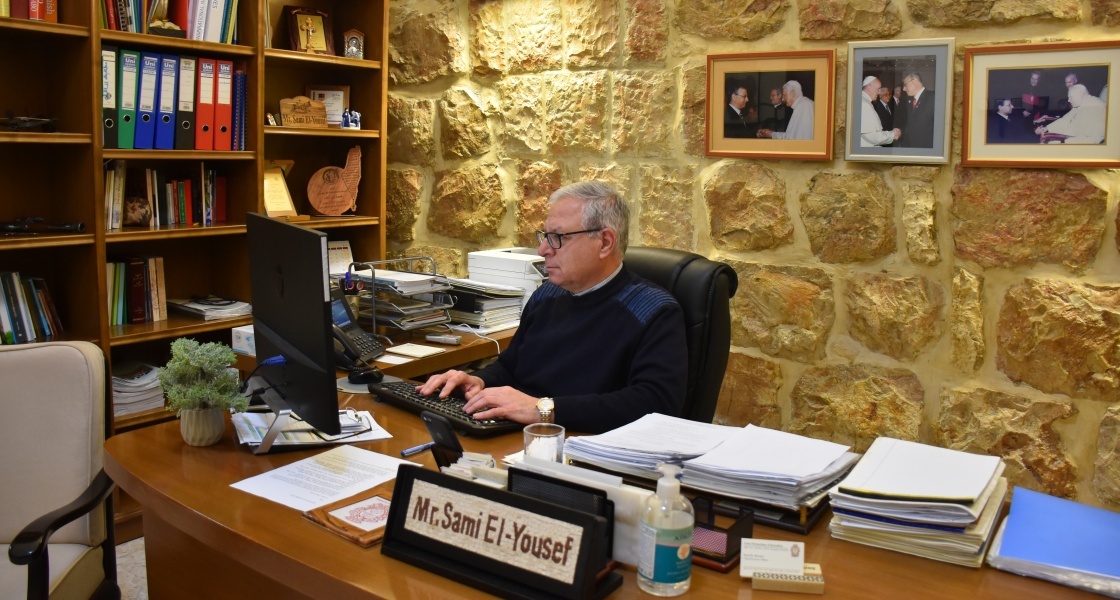INTERVIEW – Appointed CEO in 2017, Mr. Sami El-Yousef was the first layperson to ever assume such a position within the Latin Patriarchate of Jerusalem. After five years spent working for the diocese, he accepted to share some thoughts on his responsibilities, achievements, and future projects.
- You are the first layman to hold the position of CEO of the Latin Patriarchate of Jerusalem. How do you explain this change? And how do you feel about it?
The trend within the Church to entrust laymen with important responsibilities is nothing new, but it came late for the Latin Patriarchate of Jerusalem. Like you said, to appoint a layman as General Administrator is a first for the diocese. On a societal level, it is historical; on a personal level, I feel very proud and honored by the trust placed in me by the Patriarch. I believe that, by hiring a layman with good experience and expertise in the management of administrative and financial affairs, the objective is to establish professional standards for the conduct of such work.
- What were your previous positions? Regarding your current job, did you benefit from these experiences?
I spent 24 years in Bethlehem University, first as a teacher in business administration, then as the dean of faculty of business administration. After that I became assistant vice president for academic affairs, and then vice president for finances and planning, from 2000 to 2009. I was the first layman to assume that position. I left the university in 2009 to join the CNEWA (Catholic Near East Welfare Association) – Pontifical Mission for Palestine office, as regional director for Palestine and Israel. My work, which had been focused on academic and theoretical studies, became much more in the field; I was involved in humanitarian and development missions, whose aim was to provide quality services to marginalized communities and Christian institutions – especially those in the Gaza strip after the 2008 war – in the sectors of education, health, and social services.
- As General Administrator, what are your responsibilities and duties?
They are divided into two main sections: the general administration and the financial administration. In other words, I am directly responsible for all the administrative departments of the LPJ. These include finance, IT, social services, human resources, project development and financing, procurement, endowments, and engineering.
- What are the countries in which the Latin Patriarchate provides services?
Our diocese includes four countries: Jordan, Israel, Palestine, and Cyprus.
- You were appointed CEO in 2017. What has been achieved so far?
There were a lot of achievements over the past few years. We have:
- introduced the principle of annual budgets and reintroduced the annual external financial audits
- restructured all administrative and financial systems, including a new organizational structure respecting internal controls and separation of duties
- introduced new job descriptions for all positions in finance
- introduced standardized operating procedures in all the diocese.
- unified the annual budgets and the fiscal years in all the diocese.
- restructured all bank accounts so that two signatures are required for any expenditure to enhance internal controls
- What are the projects of the diocese, and is there something regarding employment in Gaza?
We work annually on 40 projects focusing on the construction and renovation of properties, churches and schools. In other words, we develop and modernize infrastructures affiliated with the Latin Patriarchate. We also provide humanitarian services. For instance, we created a job opportunities program in the Gaza Strip, to provide job opportunities for the residents after training and qualifying them for a period of two years. This enables them to gain experience so that they can find jobs in different places, such as banks and hospitals, or in institutions affiliated with the Patriarchate. Thanks to this program, 70 employees from Gaza are now living a dignified life, away from charity. We also provide humanitarian services to Iraqi refugees in Jordan, which include housing allowance, health insurance allowance and education allowance. Another thing we achieved is the creation of a finance council, whose task is to review, study and approve annual budgets and external audits.
- Let’s talk about setting financial priorities. What are the criteria for that, and how about the role of the finance council?
The priorities are left to the various institutions to be determined. As for the finance council, its members study them, determine their importance, and approve them.
- How do you prevent the possibility of confusion between the management of the resources of the Patriarchate and individual or family interests?
Through the faithful implementation of the standard operating procedures, which allow us to distribute tasks for all sectors of the Patriarchate, each with its own responsibility. They make sure that personal interests do not prevail over public interests.
- What are some of the biggest challenges you faced?
Providing financial resources to the Patriarchate’s administration on an annual basis, and providing salaries for about 2 000 employees. The lack of international support due to the weakness of the Palestinian cause globally is also a big challenge… as well as the crisis experienced all over the world by the Catholic Church, as well as the scarcity of its resources. Of course, the COVID-19 pandemic, which reduced the financial resources of donors, was also a very big obstacle to overcome.
- What are the new aspects that this position brought?
What is new is the great challenge of running an institution of the size of the Latin Patriarchate, in every sense of the word. Another aspect I did not experience before is the spirit of teamwork shared between priests and laity, as well the distribution of roles and responsibilities, that must be organized in the best interest and development of the Patriarchate – without forgetting that we all work for the Church; the value system is what should guide our work, not the business standards, in order to maximize the benefit to our local communities.
By: Sami El-Yousef
https://www.lpj.org/






